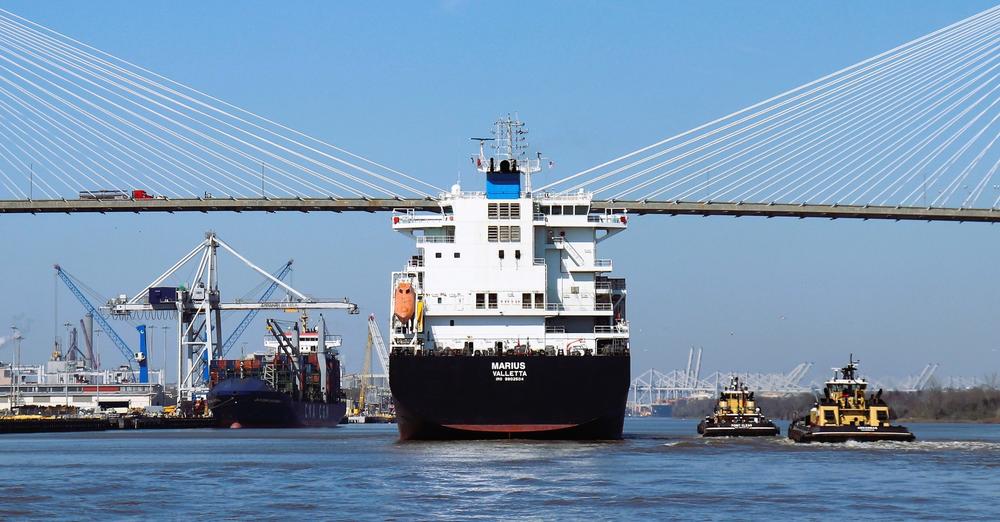
Caption
The container ship Marius sails through the Savannah River in February 2023, shortly before passing beneath the Talmadge Memorial Bridge en route to the Port of Savannah.
Credit: Benjamin Payne / GPB News
LISTEN: Officials are underscoring differences between the bridge which collapsed in Baltimore and the bridges which lead to Georgia's two seaports. GPB's Benjamin Payne reports.

The container ship Marius sails through the Savannah River in February 2023, shortly before passing beneath the Talmadge Memorial Bridge en route to the Port of Savannah.
In the wake of the container ship Dali's toppling of the Francis Scott Key Bridge in Baltimore early Tuesday morning, Savannah Mayor Van Johnson is urging calm among residents of his city, which is home to the East Coast's second-busiest container port, behind only the Port of New York and New Jersey.
“I think our residents can feel safe,” Johnson told reporters, referring to the Savannah River, where cargo ships sail beneath the Talmadge Memorial Bridge in order to access the Port of Savannah.
Johnson said that he expects “some diversions this way” as U.S. ports prepare to absorb cargo traffic over the coming weeks that otherwise would be traveling to the indefinitely closed Port of Baltimore.
“I've been on these ships with these river pilots,” he said, referring to captains with the Savannah Pilots Association tasked with safely guiding vessels to and from the Port of Savannah. “They are the best that they are. They navigate a much narrower waterway than what is in Baltimore, and they do it with skill and precision.”
Surveillance video of the Key Bridge collision appears to show Dali striking a bridge support column in the waters of the Patapsco River.
Unlike that bridge, Savannah's Talmadge Memorial Bridge does not have support columns standing within the shipping channel.
This distinction was pointed out by the Georgia Ports Authority — which owns the Port of Savannah and the Port of Brunswick — in a statement that it issued in response to the Baltimore incident.
The GPA went on to say that Savannah port pilots “have an excellent safety record,” handling 45 ships per week and having navigated 2,000 ships in the 2023 fiscal year.
These escorts “take special precautions bringing ships in and out of the port, including the use of two to three tugs,” the GPA stated. “Equally important, whenever there is a first call for a new vessel into the port, the pilots observe a ‘daylight only’ transit for safety.”
The quasi-state agency also commented on Brunswick port pilots, who it said safely navigated 600 vessels in the 2023 fiscal year and who use tugboats “for assistance when needed.”
Until the Port of Baltimore's abrupt closure, it had been the nation's busiest facility for handling automobiles — a specialized form of cargo known as “roll-on, roll-off” or “RORO” that is unique from container shipping.
Now, that top spot effectively belongs to the Port of Brunswick, which had already been gaining on Baltimore for RORO dominance prior to the Key Bridge collapse.
The GPA declined to comment on the extent to which Brunswick would take on added RORO cargo in light of Baltimore's closure. Its statement did, however, mention the bridge spanning the Brunswick River which ships must sail beneath in order to access the port.
“The Sidney Lanier Bridge in Brunswick has stanchions in the water which have a 2-acre rock area around them to protect them,” the GPA stated. “In between the stanchions is a 1,000-foot-long roadway span that is above the shipping channel. This shipping channel is 400 feet wide for vessel transit.”
In 2019, the RORO ship Golden Ray capsized in nearby St. Simons Sound after having left the Port of Brunswick, running aground about 5 miles after the vessel had cleared the Sidney Lanier Bridge.